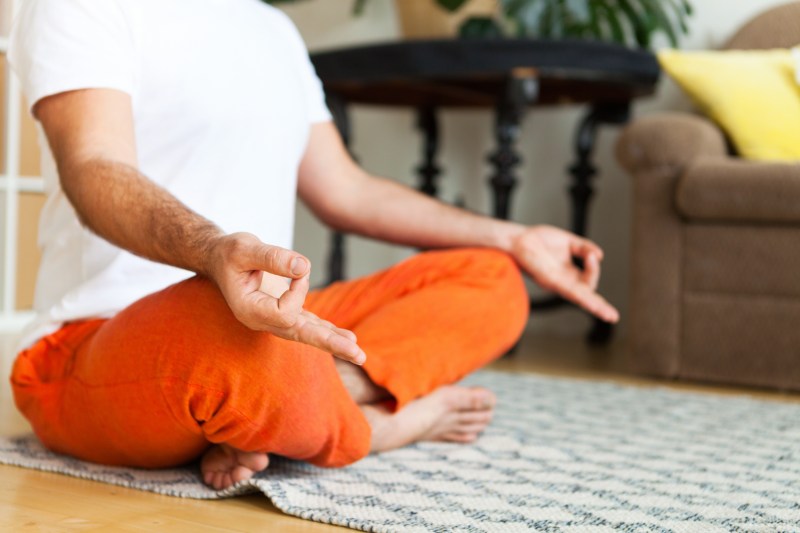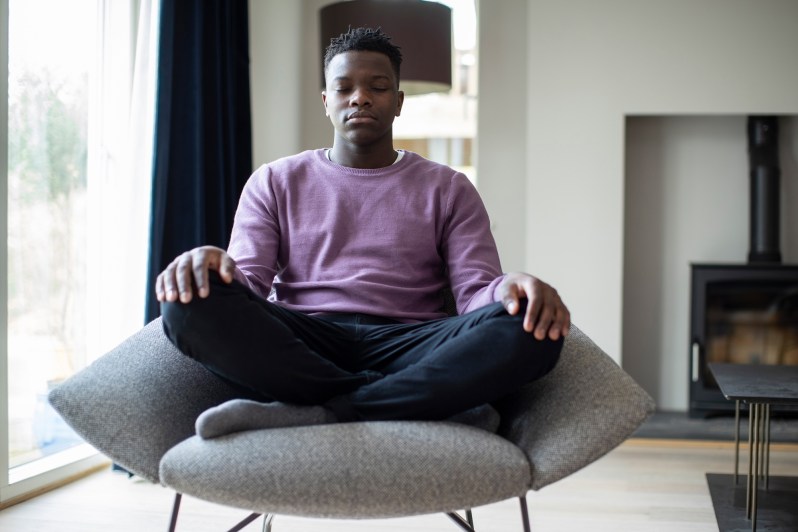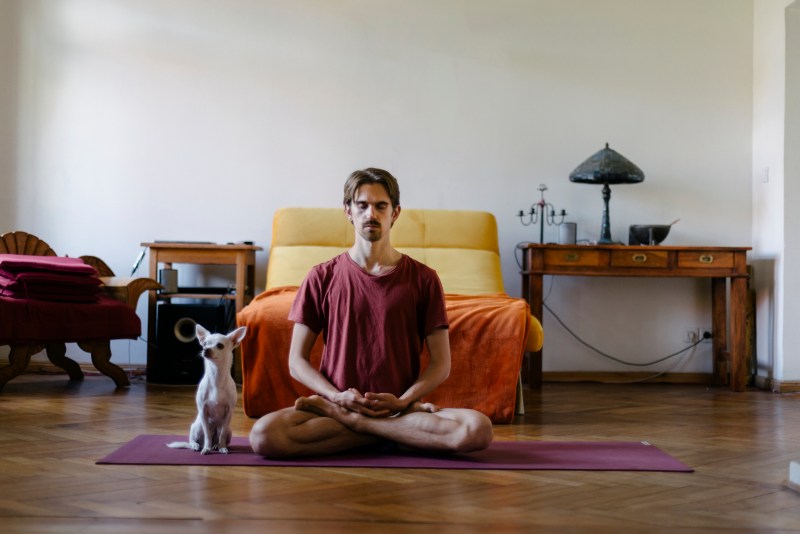
Everyday life can feel like a never-ending choreographed dance of trying to keep a dozen plates that hold your various responsibilities spinning simultaneously. Stress can peak further during the holiday season when emotions run high and the demand for your time and attention mounts. If you find yourself staring down the holiday season with trepidation and tension, it might be a good idea to equip yourself with self-care tools to navigate the holidays — or any time of year — with more tranquility and calm.
Practicing mindfulness is sometimes relegated to airy-fairy, woo-woo fluff or considered to be reserved for monks or die-hard yogis, but mindfulness can easily and effectively be implemented even if you’re a guy who’s rarely seen in anything other than a business suit and have never set foot on a yoga mat.
To learn more about the benefits of mindfulness and how to practice mindfulness to reduce stress, we spoke with Kristin McGee, a Celebrity Yoga Instructor and Mindfulness Expert. Get ready to take a deep, cleansing breath and stave off stress so that you can actually enjoy the season and feel your best.

What is mindfulness?
Mindfulness refers to the art of being fully present and mindful of what you are doing and feeling at each moment in time, rather than moving through the motions automatically, detaching yourself emotionally or mentally, splitting your attention among multiple subjects, or thinking about one thing while doing another.

What does practicing mindfulness entail?
McGee says practicing mindfulness can be as easy as closing the computer tabs on your laptop and only concentrating on one task at a time. “Mindfulness can mean fully listening to the person who is with you speaking instead of looking at your phone or thinking of what’s for lunch,” she explained. “Mindfulness is paying attention when you’re putting away the dishes and being aware of your surroundings when walking down the street. Mindfulness is also watching the breath in meditation.” In other words, mindfulness is simply being in the moment and present with what you’re doing while you’re doing it.

Benefits of mindfulness
Mindfulness is beneficial for emotional and mental health and well-being and may improve sleep by easing anxiety. “Being mindful helps us slow down and connect to ourselves and others. Mindfulness helps us relax into the present moment without overthinking about the future or perseverating on the past,” McGee said, who noted that mindfulness can also help you find more inner peace while also improving focus and concentration. “We can actually get MORE things done when we practice mindfulness and pay attention, and [it] helps keep us from getting hurt or missing out on precious moments with our loved ones.”
More benefits of practicing mindfulness
There are more benefits of mindfulness in addition to the things that McGee mentioned above. When you practice mindfulness, you may let yourself experience these benefits as well:
- Reduced pain: Mindfulness can assist you in managing pain more effectively by helping you accept and tolerate it. It may also help reduce the need for pain medication.
- Lowered blood pressure: Mindfulness can help lower blood pressure and improve heart health.
- Improved communication: Practicing mindfulness can help you listen more attentively and communicate more effectively with others. As a result, it may also help reduce conflict and improve your relationships.
- Increased empathy and compassion: You may develop greater empathy and compassion for yourself and others when you practice mindfulness. It may also help you improve social skills and build stronger relationships.

Mindfulness for men
While the discussion of stress relief, self-care, and mindfulness tends to center on women, men are equally in need of self-care strategies to mitigate daily stressors, and mindfulness is a perfect place to start. “Men tend to be natural problem solvers and feel the need to fix things. Mindfulness can help men be less reactive or results-based by allowing them to just be in the moment and soak it in without thinking something needs to be done or accomplished,” McGee explained, who speaks to the cultural gender bias surrounding mental health, saying, “I think for men it’s hard since they are often thought of as being ‘strong’ or the ones to hold things together. It’s OK for men to have a sensitive side and to get in touch with it.”
Mindfulness can help facilitate this as it helps you become more aware of your emotions and how you are feeling. Moreover, besides just getting you to identify your emotions, mindfulness centers around embracing what your emotions are as you have them without any need or expectation to change them. McGee said this can “help men become more expressive and open with their feelings in a thought-out way instead of reactive or guarded.”

Practicing mindfulness through the holidays
The holidays can be particularly stressful times due to travel, family obligations, memories, shopping, cooking, coordinating schedules, managing expectations, and various competing demands. McGee adds that the emphasis is often disproportionately placed on the big event rather than on cherishing all the small moments and joys of the season leading up to that day. “It’s the little moments that mean the most oftentimes,” McGee shared. “When we are present with ourselves and others, that’s truly the best gift you can give to anyone.”
So, how do you actually practice mindfulness during the holidays? It’s easier than you may think: Pay attention to your breath. Repeat a simple mantra: Just this breath, just this moment. Become aware of all five senses and take note of them in each moment,” McGee suggested. “When we stop and think about not only what we are seeing, but also what we are feeling, tasting, smelling, and hearing, we feel more grounded and anchored, we become super aware of our surroundings and ourselves in that space.”
Another good suggestion is simply to start your day with 5 to 10 minutes of meditation to focus your mind and set your intention to be present as you move through the day ahead. McGee also says eating well and supporting your immune health through the busy holiday season helps fortify your body to mitigate stress. “When on the go, my favorite product to add to my daily routine is Emergen-C. It makes supporting my wellness easy and fun, with delicious dietary supplement mixes and gummies packed with vitamin C, B vitamins, and more.”

Emergen-C Immune+ 1000 mg Vitamin C Powder
This Super Orange Emergen-C provides you with nutrients, including vitamins C and B. Just empty a packet into a 6-ounce glass of water, stir, and drink. For a lighter flavor or to enjoy the citrusy drink for longer, mix it with more water.
Using mindfulness throughout the holiday season and beyond can help increase gratitude, reduce stress, and soak up the gifts and joys of everyday life. “To capture a moment with your full attention is very powerful. Soon you become aware of the many gifts in your life like a beautiful sunset, a soft cozy blanket, a warm hug,” McGee noted.
Her final advice is perhaps the most important takeaway no matter what time of year it is: “Try to remind yourself it’s truly OK to BE; we are ‘human beings’ not ‘human doings,’ and it’s OK to take your time, to slow down, to take care of yourself, and allow the present moment to be everything you need.”



